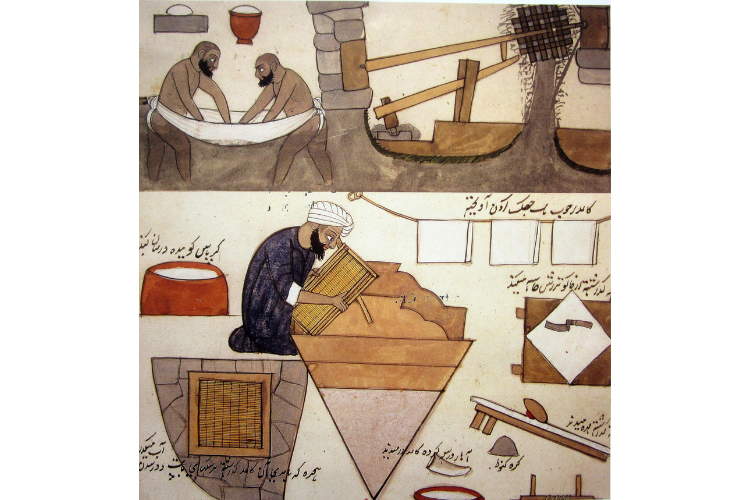Reliving the Past: Undergraduates Recreate Medieval Experiences

In Spring Semester 2022, 15 Emory undergraduates engaged in an array of creative, hands-on experiences to draw connections between the present and distant past in JS 371: Medieval Egypt: A History of Everyday Life, a course taught by TIJS core faculty member Craig Perry, who is Assistant Professor of Middle Eastern Studies and Jewish Studies. Keenly aware of how the pandemic conditions were stretching and overwhelming students, Perry strove to create a relaxed yet uniquely engaging course experience. In doing so, he harnessed Emory’s formidable resources as well as the surrounding community to engender a classroom that allowed for playfulness and risks, culminating in students introducing personalized original ideas for their final project.
Perry’s course asked students to imagine a day in the life of a resident in Cairo, one of the greatest political, cultural, and commercial centers of the High Middle Ages. Cairo was not only the seat of an Islamic empire and the venerable Coptic Christian Church. It was also home to a thriving Jewish community where luminaries like Moses Maimonides produced lasting contributions in both Hebrew and Arabic. In their daily lives, Jewish merchants, artisans, and their families were integrated into this larger society. In the absence of a medieval survival guide, this thought experiment required students to consider what, at first glance, appeared to be a set of basic questions: What do you do for a living? What do you eat and where does your food come from? Who makes the bowls and cooking utensils you need to eat? Do you get married? And divorced? What happens if you get sick? What do you do if you have a problem that you can’t solve alone, or if you have been wronged?
In answering these questions, Perry utilized hands-on experiences to provide students with a material connection to the concepts they normally just studied through text. For example, as they learned about paper – a seemingly mundane item today that represented a revolutionary technology in the past – and the impact it had on medieval society, the class went to Georgia Tech’s Robert C. Williams Museum of Papermaking. There, they created paper using the same methodology as the Egyptians while discussing how it changed the way governance occurred, how people communicated with each other, and how they sought justice. When researching medieval plants and medicine, the class took a trip to Emory’s Herbarium; and when exploring the diet of medieval Egyptians, the group enjoyed a feast of authentic recipes from the past. In planning their final projects, students began in Emory’s creative think space, The Hatchery, and also employed the resources of TechLab, a visual arts studio in the Cox Hall Computing Center.
Students really took to and appreciated this approach, with alumna Rachel Shin 22C reflecting, “As a senior, I wish that I had the opportunity to take this course earlier, as the various excursions to different sites made me realize that there are so many resources at Emory that I never even knew to utilize. Be it the entrepreneurial environment of the Hatchery, the design space of the TechLab, or the extensive plant archives of the Herbarium, I appreciated that Professor Perry always encouraged creative initiative in a variety of forms. Notably, the final project stood out in this regard.”
As a way of combining the experiential approaches with intellectual inquiry, Perry allowed students to propose their own final project ideas, in consultation with him, to showcase what was important to them about the class. The results demonstrated a meaningful connection in bridging students’ personal lives with their academic study of the Middle Ages. To that end, about half the class designed and planned medieval banquets, using authentic ingredients and recipes to cook for their friends and families. Others wrote works of historical fiction based in medieval Cairo, taking academic topics and using them as the backdrop for their storylines. Finally, another group of students created escape rooms set in medieval Egypt, which entailed designing puzzles and challenges to be solved in order to “escape” an imagined situation.
Overall, these projects successfully encouraged students to open a larger investigation into the nature of the pre-modern world, how it has shaped modern societies, and how it influences their own daily lives. Speaking to their impact, sophomore Zimra Chickering reflected that the “final projects were an extension of this immersive and multifaceted course experience, as Professor Perry encouraged us all to engage with new ideas and concepts, while also exploring areas of study that we were already passionate about. My final project combined my interest in current nutrition science and ethnobotany with the culinary history of Medieval Egypt, and it enhanced my understanding of … the everyday life of Egyptian Jewry, from their occupations and family units to their understanding of food and medicine."
In the fall, you will find Perry teaching JS 420: Judeo-Arabic: Language, Culture, History, and continuing to advance his vision of providing students with the tools and experiences to hone their originality.
Published 8/16/22